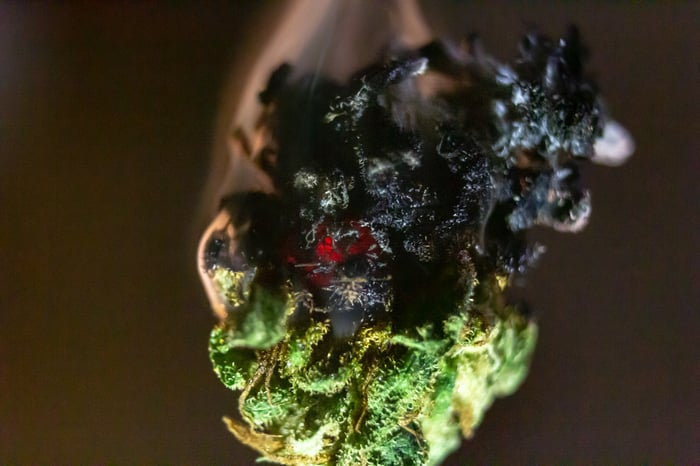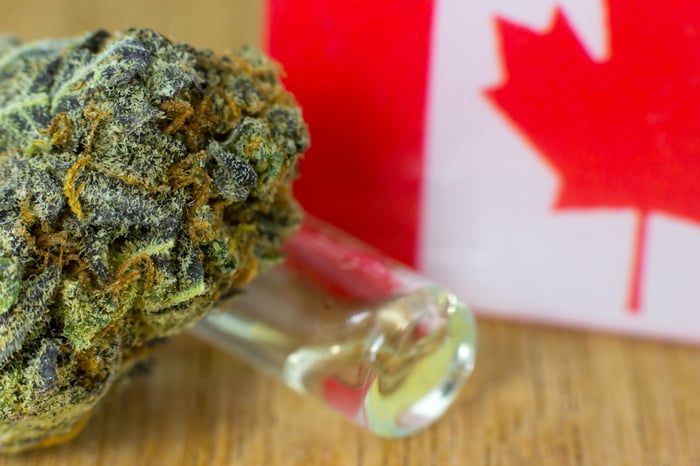Cannabis is likely to be one of the fastest-growing industries of the decade. According to New Frontier Data, legal weed sales in the U.S. are expected to grow by an annual average of 21%, ultimately hitting north of $41 billion by mid-decade. Meanwhile, the Canadian pot market is expected to see sales vault from $2.6 billion in 2020 to $6.4 billion by 2026, per BDSA.
While this sales growth will undoubtedly make some cannabis investors rich, we also know that not every marijuana stock can be a winner. The following trio of pot stocks stand out for all the wrong reasons and should be avoided like the plague in August.

Image source: Getty Images.
Aurora Cannabis
Aurora Cannabis (ACB -0.54%) was once the most-held stock on online investing app Robinhood. It had 15 production facilities, was expected to peak at well north of 600,000 kilos of annual production, and sported a market cap of nearly $10 billion. Nowadays, it's a regular resident of the pot stocks to avoid column.
Even though cannabis is treated as a traditional consumer good (i.e., demand is pretty steady, no matter how well or poorly the U.S. economy is performing), and Canadian weed revenue has been climbing, Aurora Cannabis' fiscal third-quarter operating results were abysmal. Net cannabis sales plunge 21% from the prior-year period, with recreational weed revenue declining 53%. While the coronavirus pandemic took much of the blame, it's tough to sweep a 53% sales drop under the rug when total pot sales for the country have been trending higher.
To be fair, Aurora Cannabis and its Canadian peers have been hurt by regulatory miscues at the federal and provincial level. For example, it took far too long for Ontario's regulators to realize its dispensary lottery system wasn't working. This led to supply bottlenecks that are still being worked out. But Aurora's roughly one dozen grossly overpriced acquisition didn't help its cause, either. Over the past two years, the company has written down in the neighborhood of half of its total assets.
Arguably the bigger issue for Aurora Cannabis is that it's no closer to reaching profitability than it was at this time last year. Through the first nine months of fiscal 2021, Aurora posted an operating loss of $232.3 million Canadian ($186.2 million U.S.). That's only an 18% reduction from the comparable nine-month period in fiscal 2020. The company's management team has outlined numerous forecasts to reach positive earnings before interest, taxes, depreciation, and amortization (EBITDA), but none of these projections have come to fruition.
And if you need one more rock-solid reason to avoid Aurora Cannabis like the plague, take into account the company's nonstop share-based dilution that's been used to fund acquisitions and cover day-to-day operating expenses. Taking into account a 1-for-12 reverse split enacted in May 2020, Aurora's share count has ballooned from 1.3 million shares in mid-2014 to about 198 million shares by March 31, 2021. Devoid of catalysts, Aurora Cannabis should be avoided by investors.

Image source: Getty Images.
Cronos Group
Another pot stock that should be given the cold shoulder by investors in August is Cronos Group (CRON -2.49%).
Like Aurora, Cronos is a Canadian weed stock that's pretty popular with retail investors on Robinhood. But unlike Aurora, Cronos Group is well funded. That's because it closed a deal in March 2019 to sell a 45% equity stake to Altria Group (MO 1.36%) for $1.8 billion. Altria is the U.S. tobacco company behind the premium tobacco brand Marlboro.
When the Altria deal closed over two years ago, the expectation was that Cronos would use this capital to push into the U.S., as well as work hand-in-hand with Altria to develop high-margin derivatives, such as vapes. With cigarette volume declining in the U.S., it's been in Altria's interests to develop alternate sales channels beyond just tobacco. However, much like in 2019, cannabis reform measures in the U.S. have stalled. This has effectively minimized the impact of having Altria as a vested partner.
What's more, Cronos did make a deal to enter the U.S. market, but it looks to have grossly overpaid. In September 2019, Cronos closed on a $300 million buyout of four operating subsidiaries of Redwood Holding Group in order to get its hands on the Lord Jones brand of cannabidiol (CBD)-infused beauty products. Though CBD was all the rage in 2019, U.S. sales have fizzled badly since. Based on first-quarter sales, Cronos is on pace to bring in less than $10 million in the U.S. this year. That's peanuts for a company Cronos shelled out $300 million for.
Although the company deserves a pat on the back for not overextending its production capacity in 2018 and 2019 like some Canadian pot stocks (ahem, Aurora), it could be argued that Cronos' lack of production will hold it back. Outside of Peace Naturals, which caps out around 40,000 kilos of annual output, Cronos' asset portfolio simply doesn't match its $2.7 billion market cap.
Until Cronos Group narrows its quarterly losses and demonstrates serious sales growth momentum, it has no business, in my view, being valued at much more than its net cash value ($1.23 billion).

Image source: Getty Images.
Sundial Growers
The third pot stock to avoid like the plague in August is a frequent visitor to this monthly list: Sundial Growers (SNDL 1.64%).
Sundial is the fourth most-held stock by retail investors on Robinhood and is lauded for two key reasons. First, it's a penny stock, and younger investors have a tendency (albeit incorrect) to believe that buying more shares of a low-priced stock will give them a better chance to quickly grow their wealth. Second, Sundial is sitting on a mountain of cash, $866 million, as of May 7.
Though this war chest ensures that Sundial has more than enough capital to execute on its business strategy for the foreseeable future, the real issue is that management has been continually selling stock to raise this cash. Instead of simply selling enough stock to pay off its debt, Sundial's management team has been persistently raising capital and drowning the company's investors in new shares for the past 10 months. Between Oct. 1, 2020 and May 7, 2021, Sundial issued approximately 1.351 billion new shares of stock, which more than tripled its outstanding share count.
With at least 1.86 billion shares outstanding, the company has virtually no chance of ever generating meaningful earnings per share. Additionally, having so many shares outstanding (with more dilution likely coming) is liable to keep the company's share price around or below $1. That makes delisting from the Nasdaq exchange a real possibility.
To make matters worse, the company's retail cultivation operations have been subpar. Switching from wholesale to retail has led to persistent double-digit declines in gross cannabis revenue. While I will point out that Sundial's operating performance has improved, it's still a long way from generating a recurring profit and in any way justifying a $1.5 billion market cap.
In March, I dubbed Sundial the worst pot stock money can buy. I still stand by that statement.





